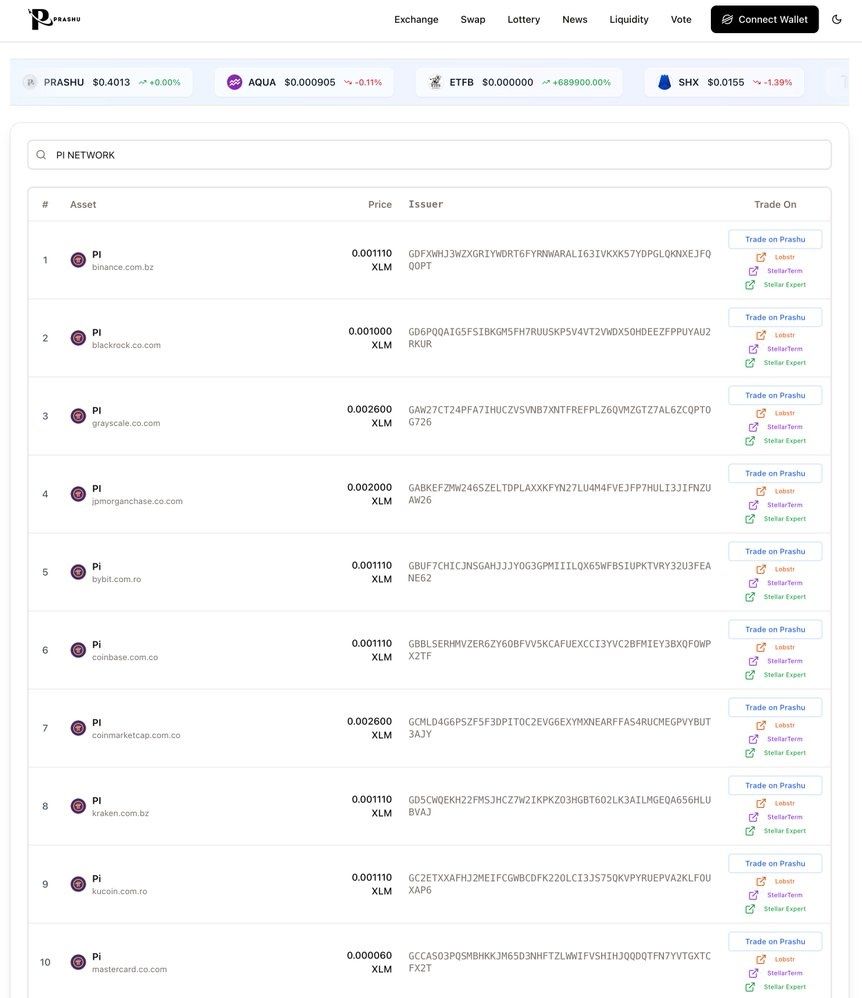Fake Pi Coins Appear on Prashu DEX Amid Unverified Stellar Integration Rumors
Fraudulent Pi token listings on the Prashu platform have fueled confusion amid unverified partnership rumors. While Pi Network and Stellar share some technical origins, they operate independently—making vigilance essential for users.
Fraudulent listings purporting to offer Pi Coins (PI) for trading on the Stellar (XLM) blockchain have emerged on a decentralized exchange (DEX), prompting warnings from users.
The scam surfaced amid rumors suggesting that Pi Network might leverage Stellar as a settlement layer for its upcoming decentralized applications (dApps).
Scam Warning: Fake PI Listings Appear on Prashu Platform
Screenshots circulating on X (formerly Twitter) showed an interface from the platform Prashu that included multiple “PI” assets supposedly available for trading. The listings included price and issuer details designed to mimic legitimate tokens, giving the impression of authenticity.
 PI Network Scam On Parshu. Source:
PI Network Scam On Parshu. Source:
However, prominent Pioneers quickly raised the alarm, labeling the listings as fake and urging users not to interact with the platform.
“This is a scam – do not buy PI on the Stellar network. For all we know Prashu is in on the scam. The addresses linked to the tokens are clearly fake,” a Pioneer stated.
🚨 PEOPLE ARE ASKING about $Pi Network token on the Stellar $XLM network.AT THE MOMENT, there is no verified Pi token on #Stellar.Always DYOR before buying anything.
— Lumexo | Stellar Wallet (@lumexodapp) October 18, 2025
Notably, Prashu, marketed as a Stellar-based DEX, has been suspended. It’s not the first time that the platform has been involved in such a controversy.
In August, a user publicly accused Prashu of theft following a rigged giveaway that lured participants into revealing private keys, resulting in the loss of crypto holdings.
“SCAM ALERT!!!! They stole my tokens. Someone organized a giveaway – 1000 XLM to win – you had to make any transaction on Prash. They provided a link to an exchange, and the only “Wallet Connect” option was a private key. You had to like the post, retweet it, and comment “done”. And I did it. The next day, USDC and TKG disappeared from my account,” the user explained.
Protocol Confusion: Pi Network’s Path Versus Stellar
The scam coincides with unverified reports of a Pi-Stellar partnership. One user claimed Pi Network will launch real-world asset trading dApps using Stellar as the settlement layer. The post stated,
“Pi Network is expected to launch dApps for RWA trading by early 2026, with XLM as the settlement layer. This is adding 60 million users to the Stellar XLM ecosystem with a single integration. Unlocking instant access to its full DeFi infrastructure. Parallel transactions & smart contracts enable trading of real-world assets.”
However, once again, the community was quick to question the credibility of these claims. Many Pioneers pointed out that Pi Network already operates on its own blockchain, so it doesn’t need Stellar.
“That doesn’t even make sense. Pi would use it’s own blockchain for settlement,” another user replied.
Furthermore, neither Pi Network’s Core Team nor the Stellar Development Foundation has made any official announcements confirming such a collaboration. The absence of official statements further emphasizes that the partnership narrative likely stems from community speculation rather than verified developments.
Meanwhile, Pi Network and Stellar have a long-standing and often confusing relationship. Although the Pi Network borrows from Stellar, the blockchains remain separate. Owning XLM provides no privileges in the Pi Network, and actual PI transactions do not interact with Stellar’s ledger.
Official documentation clarifies the distinction: Pi Network’s consensus mechanism is adapted from two key technologies: the Stellar Consensus Protocol (SCP) and the Federated Byzantine Agreement (FBA)
This enables energy-efficient validation via trust graphs, eschewing proof-of-work’s power demands. The separation was reiterated in Pi Network’s August announcement of its protocol upgrade from version 19 to 23.
“Pi Network is preparing an important upgrade: the move from protocol version 19 to version 23. The Pi protocol is adapted from Stellar protocol. This version is a custom Pi protocol built on a base pulling upgrades from Stellar protocol version 23 that enables new layers of functionality and control,” the team stated.
The latest fake token incident again highlights how quickly misinformation can spread in crypto communities—especially when rumors of high-profile partnerships gain traction. While Pi Network and Stellar share certain technical roots, they remain separate ecosystems.
Thus, users should remain cautious, verify information from trusted sources, and avoid engaging with unverified platforms claiming to list or trade Pi Coins.
Disclaimer: The content of this article solely reflects the author's opinion and does not represent the platform in any capacity. This article is not intended to serve as a reference for making investment decisions.
You may also like
Timeless Strategies for Today’s Investors: Insights from a Classic Work and Warren Buffett
- McNeel's 1927 investment framework and Buffett's value investing principles combat modern market psychology traps like herd behavior and overconfidence. - Behavioral finance research validates their focus on emotional discipline, intrinsic value analysis, and long-term optimism as antidotes to speculative chaos. - Case studies like Buffett's Apple investment and 2025 MMT token surges demonstrate how these century-old strategies outperform emotion-driven trading in volatile markets. - The principles empha

MetaComp Raises $22M: A Stunning Pre-Series A Funding Victory for Fintech
Crypto Liquidations Reveal Market Tension: Bitcoin Longs and Ethereum Shorts Hit Hard
Polymarket Trading Volume Exposed: The Shocking Double-Counting Error Inflating Prediction Markets
